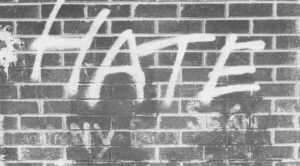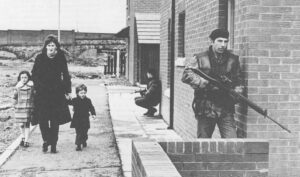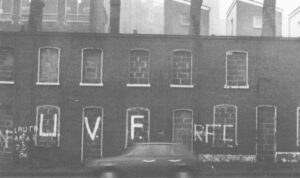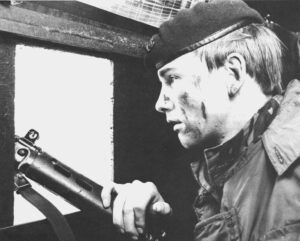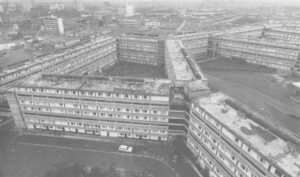(BELFAST) — Short guy, this Jimmy Barr. Thirty years old, cocky, given to drunkenness, he will go out of his way to irritate an enemy, and he has several thousand of them, all well armed and patrolling his neighborhood day and night. Unemployed, has been since 1969, probably will be in 1989, if he is still alive. Plays the horses, but not so well. When I first met him, he had a tip on Nameless Pixie, a hound running at Belfast’s Dunmore track, but Jimmy doesn’t bet on the dogs. Nameless Pixie paid three to one.
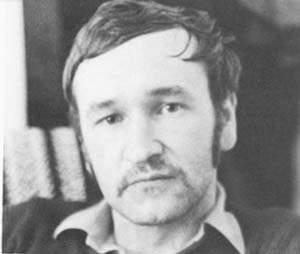
Like thousands of Belfast men and boys, Jimmy has a tattoo. His right forearm is interrupted by a small blue heart with “MARIE” written inside. Marie is his wife, a pleasant lady with large blue eyes, near perfect teeth, and — very rare in Belfast — a trim figure. She grew up in a local housing project called Turf Lodge, worked for a short time as a stitcher at the Ladybird Shirt Factory when she left school, but abandoned both job and city to move to England with her mother. In London she found work as a shopgirl at Woolworth’s, but grew to hate it. She felt her superiors mistreated her because she was Irish, and after nine months, she and her mother came home.
Marie first saw Jimmy when he yelled at her in a Belfast housing project, and they met a few days later in a shebeen called the Nail Bomb, one of scores of illegal drinking clubs that replaced the Catholic pubs that had been bombed during the troubles. The Nail Bomb is now gone, and Jimmy and Marie frequent the Pound Loney, a legal club with Republican sympathies that takes its name from an old Catholic ghetto in the area. Jimmy plays pool for the Pound Loney Hustlers, and describes the bar as “a workingman’s club, except that nobody in it has a job.”
Jimmy confronted his first job at 17 when he was employed as a message boy at a linen factory on the Falls Road. He worked there for two and a half years, one of the few Catholics in the plant, and he says he felt a bit out of his element in rooms displaying the Union Jack and pictures of the Queen. He was learning how to pack the linen for shipping when the troubles started and the factory burned down. He has not had a steady job since.
Back in those days, Jimmy would pick a fight with just about anybody, and troubles came naturally. He says he went in for liquor and women and between the two had no time for the IRA, but his cantankerous personality made him suspect. The army picked him up in one of the big sweeps that began in August, 1971, when Catholic men were corralled at dawn and held without trial on an indefinite sentence as prisoners of war in a camp called Long Kesh. The policy was called internment, it lasted three and a half years, and it was a massive abuse of civil liberties that backfired on the English, as it alienated the innocent and threw them together with politically committed hardliners, anxious to enlist new recruits.
The Barrs met and were married during a 12-month period when Jimmy was between spells as a prisoner, and for the next few years they were together for only a couple of months at a time. Jimmy hated the time he served in Long Kesh because there was nothing to do. The inmates were prisoners of war and did not do prison work. To pass the time, they took up handicrafts, and their work is proudly displayed in windows all over West Belfast. Jimmy made two music boxes from kits for Marie. One is in the shape of a piano and plays “Danny Boy”. The other is in the shape of a harp and plays “The Anniversary Waltz”. “There used to be a wee man on the base here,” he says, pointing to the harp, “but he broke off.”
While serving time in Long Kesh, Jimmy managed to make more money than he had ever seen before, and probably more than he will ever see again. His good fortune resulted from an escape attempt on November 5, 1974, when he and 30 other men burrowed their way through a tunnel, a sophisticated passage equipped with electric light and a ventilation system. Jimmy says he joined in the escape attempt because he was bored.
The midnight escape was not quite successful. Four of the men, says Jimmy, nearly made it to the road before they were caught. One was shot dead. Jimmy was just at the tunnel’s exit when a soldier yanked him out. All of the survivors were later charged with the crime of trying to escape, and Jimmy was given six months for his role.
The attempt, however, made Jimmy’s fortune. After he was dragged out of the mouth of the tunnel and taken back to camp, he was brutally beaten. When Marie went to visit him in the hospital, she walked right past his bed, unable to recognize him. Jimmy filed a claim against the state, and two years later was offered 750 pounds, which seemed like a hell of a lot at the time, and he took it. He now wishes he had held out for more.
With the compensation, the Barrs bought a couch, two chairs, and a dining room set, and on the strength of their sudden wealth, they were able to get a loan to purchase a color TV. They also went out for a drink, on which Jimmy spent somewhere between 200 and 250 pounds. “At the end of the night, I was handing out tenners like a saint,” he says. “I came home with two pounds in my pocket.”
Two of Jimmy’s sisters are married to British paratroopers, and a third has served time for alleged IRA activities. Otherwise his life’s main elements — internment, unemployment, liquor, wife, kids — are fairly standard combinations, not at all unusual for a Catholic of his age in West Belfast. Jimmy, however, has risen above the herd and in some circles is quite famous. I first heard his name in the office of a public relations officer for the housing authority, an amiable fellow named Henderson, who told me brief tales of three famous squatters, the Barrs among them.
Squatting is common in Belfast in both Catholic and Protestant areas, and for good reason. In the early 1970s, when the troubles were escalating, Protestants intimidated Catholics, Catholics intimidated Protestants, and both groups fled neighborhoods where they were in the minority. Those who have studied the period estimate that 80 percent of those fleeing intimidation were Catholic, that 60,000 people left their homes, and that the flight was the greatest movement of population in Europe since World War II.
It was not just a passing nightmare. Today, almost a decade later, the sores still fester, the bizarre results are still an enormous problem.
The intimidation was not subtle. Houses were torched, warnings were painted on doors, and mass cards — normally used to express sympathy at someone’s death — were sent to some Catholics. Respectable people became refugees, deprived of dignity, scrambling for shelter back in the ghettoes they had left so proudly years before. From modern homes they moved into places without baths, without hot water, with toilets out back. They moved in with relatives and lived six to a room. They moved into the homes of people away on holiday and into houses under construction — some without roofs, others without floors. Schools gave them temporary shelter, and refugee camps were set up on the Irish side of the border.
In Catholic West Belfast, 58 percent of the housing is owned by the public housing authority, and in the chaos following the great flight, housing officials simply lost control. Their employees didn’t set foot in some of the housing projects for two years. Rent went uncollected. Repairs went unmade. In some housing estates, paramilitary groups took over the task of allocating vacant flats to tenants, and in some cases charged “key money” before people were allowed to move in. Squatting was not considered illegal occupation. It was not shameful. It was just the way one got a house.
The fear that the refugees felt in the early 1970s remains undiminished today. In neighborhoods that form borderlines between Catholic and Protestant areas, beautiful modern housing sits vacant. In Protestant neighborhoods, modern flats are empty. Catholics just won’t move into those areas. They prefer to live with no hot water, no bath, and the toilet in the yard, rather than move to a modern dwelling among people who are not their own.
In neighborhoods like the one called the Lower Falls, where Jimmy Barr lives, there is enormous demand for what amounts to slum conditions. Of 650 homes there, 250 are occupied by squatters. There are no functioning streetlights in some sections (the lights were put out by the army because they made the troops easier targets for snipers), no police protection, no trees, no grass, nowhere for children to play but in derelict buildings and waste ground. A family of six would be pleased to be living in a two-story brick row house with two miniature bedrooms and no bath.
A few weeks ago, an old man named Jack Cherry, a legal tenant who lived alone at 26 Spinner Street in the Lower Falls, died in the hospital, and, as is the custom, was laid out in his house for the wake. On the day of his funeral, two families hugged the doorway, determined to fight for the house as soon as the dead man’s relatives returned from the cemetery. An official of the Provisional Sinn Fein, the political wing of the IRA, was called upon to determine which of the two families was more needy, and to install them as the rightful squatters.
In 1973, the Barrs had been married less than a year and had one child. Jimmy was doing time at Her Majesty’s pleasure in the Crumlin Road Jail, and Marie was living with her mother-in-law and was anxious to get a place of her own. She heard a house was to open at 22 Plevna Street, in the Lower Falls, and in those days, if you heard there was an empty house, you were as eligible as anyone to grab it, and Marie did.
Upon moving into a vacant house, squatters must consider their options. If they pay rent to the Housing Executive (the public housing authority) at the going rate, they are entitled to wind and weather-proofing repairs, and if they stay in one spot long enough — five years or more — they might be given legal status and be entitled to a full range of maintenance and repair work. If they pay no rent, they might save some money for a while, but sooner or later the government catches on and starts making deductions in their welfare checks. The Barrs paid their rent, which came to just about 2 pounds a month for their two-story brick house. Many squatters are not so honest, and the Housing Executive admits to being owed over 10 million pounds in rent arrears.
As residents of 22 Plevna, the Barrs were just one of thousands of squatting families in Catholic West Belfast (today there are 1,600 in West Belfast, 2,400 in the entire city). They rose to fame, however, because Plevna Street was marked for urban renewal. The old houses were to be torn down, new ones were to be constructed. The lucky people who were to become tenants of the new houses were those with longstanding ties to the neighborhood who had been legal tenants and who would be displaced in order that the new development could be constructed. The Barrs may have been as needy as those slated for the new houses, but they were not in the queue. They were, however, in the way.
As the years went by, the families of Plevna Street were gradually moved out. Their homes were levelled, and by mid-1979, the Barrs were the only family left on the block. The Housing Executive offered them other homes, but the Barrs declined the offers. They wanted one of the new houses scheduled for their neighborhood. The Housing Executive refused to give them one, arguing that there were others ahead of them on the waiting list, and that the agency would lose all credibility if they gave in to what they saw as blackmail. The disagreement escalated into a private war between Jimmy Barr and the housing authorities.
Jimmy had the Executive over a barrel, and he knew it. They needed his plot of land. Sewers, electricity, water pipes, and sidewalks for the new buildings should all be laid at once and with Jimmy in the way, the agency would either have to give in to his demands or alter its plans. The Housing Executive had given out the contract to a builder with the promise of turning over empty land, and once the date for the start of construction arrived, the contractor was within his rights to sue the agency for breach of contract and should be entitled to compensation for any expenses he incurred as a result of the obstruction. In a similar case, a squatter held up a housing project for 17 months: The Executive was forced to settle with the contractor for 80,000 pounds in claims resulting from the delay.
The agency issued an eviction order. The Barrs paid it no mind. An eviction attempt in West Belfast is a good joke. This past summer, for example, the Executive was forced by Conservative politicians, advocates of law and order at all costs, to evict the Provisional Sinn Fein from its headquarters, where it had allegedly been squatting for seven years. The army and police were called in, and arrived at 1 A.M., prepared for combat. They got none, the eviction was completed by 5 A.M., and four hours later the Sinn Fein moved right back in.
If the housing authorities attempted to evict a family like the Barrs, they would be giving the local paramilitaries the opportunity to appear as protector of the down-trodden. They would also need the army and police on hand to pull it off, and it is not at all inconceivable that someone would be killed in the attempt. If the Executive constantly appeared to be operating in tandem with the security forces, they would soon come to be seen as just another arm of the enemy. They then would become targets, and, worse, lose all credibility in the areas where they are making slow progress at re-establishing order; people would find it easier to ignore the agency’s waiting list for available housing and would go back to grabbing whatever they could get their hands on. The chaos of the early years of the troubles would return, and the people would never escape the squalor that breeds hatred and revolutionaries.
So there sat Jimmy Barr, prolonging the agony of the 46 families slated to move into the new development by forcing them to five in their tenements a while longer. However, Jimmy was victim as well as perpetrator, and was by no means situated in the best of positions from which to wage a protracted war. The house at 22 Plevna had no bath, no hot water (just a single cold tap in the kitchen), and no indoor toilet. It was infested with vermin and afflicted with incredible damp. Once the contractor began work, he put a timber fence around the entire plot of land, walling the Barrs in with the rest of the acreage. Relatives coming to visit could no longer find the house, and the binmen had to be shown the round-about path to the Barr residence so they could collect the garbage.
As the months wore on, the building deteriorated still further. The toilet broke and sewage flowed into the yard. The roof fell in, and the family began sleeping in the living room, Jimmy and Marie on the floor, their three-year-old son between two chairs. Their daughter took sick and had to be farmed out to Marie’s mother for the duration. Jimmy took to drinking heavily, and he and Marie began getting on each other’s nerves.
Finally, after a struggle that lasted more than nine months, the Barrs could stand it no more, and Jimmy agreed to move. He accepted an old house the Executive offered a few blocks away, securing a promise from them to renovate it thoroughly, and one morning last spring, the family’s possessions were moved in a Housing Executive van. Within an hour, the last house on Plevna Street was demolished.
The first of the 46 new houses that Jimmy was holding up will be finished in October. To prevent more confrontations like the one with the Barrs, the tenants of the new buildings have been led to believe that grants of several hundred pounds for which they are eligible will be held back if they don’t turn over their old house unoccupied. To prevent squatters from barging in, the leader of the local tenants organization has advised his people to smash the sinks and toilets, break the windows, rip out the wiring, and pull up the floorboards; then, as they leave the house, a man is supposed to be standing by to brick it shut.
The housing authorities sanction such destruction because they need all of those lots in order to proceed with new construction. In the long run, it doesn’t matter that some of the houses being wrecked may be in far better condition than some of the homes the people of the Lower Falls now occupy.
And so the landscape grows uglier. Derelict row houses stand as eyesores; they can’t be pulled down without damaging a neighbor’s home, as each house in the row leans on the next for support. The roofs of the abandoned houses rot and cave in. The chimneys stand as lone towers, but finally they also crumble. Bricked up doorways dominate whole streets, and cement windows seem to beget cement windows. Shopkeepers flee, neighborhoods die, and finally the bulldozers level what remains, whole blocks vanish, and workmen lay an asphalt top over the entire ground. The lot is covered with scrap and garbage in no time.
Often, in a low row of bricked up houses, one, two, maybe three families will remain, almost like cavemen among the ruins. Their homes are startling — painted, neat and in their windows sit vases of flowers or wooden harps carved in Long Kesh.
Visiting photographers capture the devastation and attribute it to bomb damage or mobs bearing torches, but the old hands never make that mistake. They can read a ruined street just for what it is — a desirable place to live if you are frightened, homeless, or just too tired or old to move on.
The old hands know that nothing here is a black and white situation, and they can understand when I confess that I like Jimmy Barr. I may find his squat cruel, but I understand it. In the landscape he inhabits, Jimmy Barr seems a rational man.
The Barrs have been living in their new neighborhood for about six months now, and Jimmy almost never leaves it. The last time he did, he went to the city center a mile and a half away and was picked up by the army, interrogated, and almost charged with carrying an explosive. So he stays out of the city center, and lives his life in a very small area bordered by the bookie’s, the Pound Loney, and the building next to the public baths where he signs on the dole every Monday. He has told the employment office that he will not work outside the district. This is not unusual for a Catholic, and is simple common sense for ex-internees, as they fear for their lives in Protestant neighborhoods. Most industry, and therefore most of the city’s jobs, however, are not on the Catholic side of the river.
Jimmy is plagued by headaches, and he sometimes gets a soreness in his throat that makes him feel he is choking. He dates both problems to the beating after his escape attempt six years ago. Marie says he is extremely restless sitting in the house all the time, and that “valium is the only thing that helps him”. Jimmy, however, has decided to quit taking the drug, an effort Marie does not particularly appreciate, as she prefers the calm periods.
The Barrs’ new home is a two bedroom house on Spinner Street, formerly occupied by a woman with five children. It is substandard, but so is 20 percent of the housing stock in West Belfast. On Spinner, the Barrs have hot water, but still no tub, and the toilet is still outdoors. When Marie wants a bath, she walks a half mile to her mother’s house, and once or twice a week the Barr family swims together at the Falls Road Public Baths. Jimmy’s quiet and shy four year old son has found a derelict house nearby that he likes to play in, and for excitement sometimes throws stones at soldiers.
The Barr’s new house also has mice. Jimmy catches them by coating a board with a gooey substance called Rat Lime and setting a piece of bread in the middle of the board as bait. When the mouse comes for the food, its feet get stuck in the glue. “The more he struggles the worse it gets,” says Marie, “and then something in it causes him to suffocate.”
Once the mouse gets caught, Jimmy picks up the board, drops it in the garbage bin, and puts down the lid. Sometimes the mouse screams for awhile, he says, but it is long dead by the time the binmen come.
©1980 John Conroy
John Conroy is spending his fellowship year reporting on the “Social and Economic Consequences of the War in Northern Ireland.”

